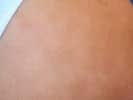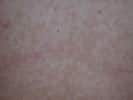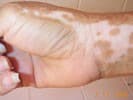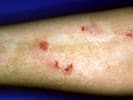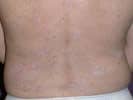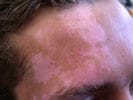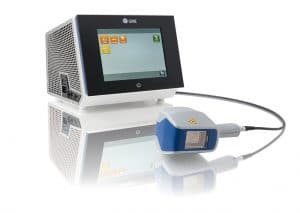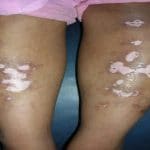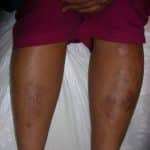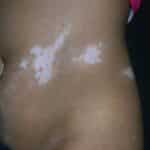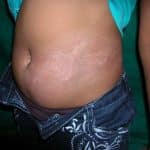The Hypopigmentation Clinic
The UK's first and only hypopigmentation clinic based in the Midlands
Dr Sagoo, one of the UK's leading cosmetic doctors, is proud to present the first clinic in the UK to treat hypopigmentation
What is Hypopigmentation?
Hypopigmentation is the absence of normal amounts of melanin (the chemical that gives skin its colour) caused by disease, injury, burns or other trauma to the skin. Hypopigmentation can be tricky to treat. Some topical medications sometimes help, and light-based procedures like IPL, and excimer lasers, can be used.
Melanin is the substance that gives skin its colour, or pigment. When the skin cells that produce melanin (melanocytes) reduce their production, the resulting condition is known as hypopigmentation (loss of skin colour), also known as skin depigmentation.
Hypopigmentation causes
The most common cause of hypopigmentation is damage or trauma to the skin. Burns, infections, pimples, blisters, scrapes, and any injuries that result in scarring can all lead to skin discolouration.
Improperly administered skin resurfacing treatments, such as Photofacials (IPL), laser peels, or chemical peels, can cause skin damage that results in hypopigmentation.
Post-inflammatory Hypopigmentation
In situations where hypopigmentation is the result of skin inflammation or damage, the condition may be referred to as post-inflammatory hypopigmentation, or PIH.
This can get confusing because PIH is also used to refer to post-inflammatory hyperpigmentation, a skin condition where pigmentation is increased, not decreased.
Other Causes:
Some chronic skin disorders can also cause hyperpigmentation, such as the following:
- Albinism - characterized by colourless skin, hair, and eyes that occurs because skin cells produce little or no melanin
- Vitiligo - characterized by patchy loss of skin colour that occurs when skin cells that produce melanin die or stop production for no known reason
- Tinea versicolor - caused by fungal (yeast) infection and characterized by scaly, itchy patches of lighter or pinkish skin
- Pityriasis alba - most commonly affects children and is characterized by colourless, scaly skin patches
Different Types:
Treating post-inflammatory hypopigmentation may involve the use of topical corticosteroids or tars (topical cream), light or laser treatment, or surgical skin grafting. Unfortunately, treatment options are often limited.
Although the numerous lasers and other light-based treatments available today are often perceived as a cosmetic cure-all, excimer lasers are the only light-based procedures that have been suggested by doctors for hypopigmentation treatment.
If a chronic skin disorder is the underlying cause, then treatment will likely involve topical prescription medications. For hypopigmentation that is unresponsive to medications, camouflaging with cosmetic tattooing or permanent makeup may be the best option.
There are 2 types of Hypopigmentation:
- Generalised: Generalised reduction in pigmentation at birth (congenital) may be racial in origin or due to albinism. Pituitary failure resulting in a lack of MSH rarely results in acquired generalised hypomelanosis. Pallor is much more frequent due to blood loss or anaemia.
- Localised: Localised hypopigmentation may be due to partial or complete loss of melanin (achromia or leukoderma).
If single or multiple pale or white patches are observed, the main diagnoses to consider are:
Localised hypopigmentation
The above images were provided by DermNet
What is the treatment of hypopigmentation?
The hypopigmentation due to inflammatory skin disorders and infections usually resolves by itself over weeks to months once the underlying disorder has been cleared. There is no effective treatment for achromia due to scarring.
The ExSys EXCIMER laser 308 nm EXCLUSIVE FIRST AND ONLY CLINIC IN UK
Dr Sagoo one of the leading cosmetic doctors in the UK is proud to be the first and only doctor in the UK to offer the latest laser in the world for treating vitiligo, psoriasis, alopecia areata, resistant dermatitis, acne and other inflammatory skin conditions that do not respond to conventional treatments.
We introduce to you the ExSys Excimer laser. Having undergone speciality training in Germany with leading world renowned experts in Vitiligo; Dr Sagoo can now exclusively offer the excimer laser to the Solihull Medical Cosmetic Clinic the No 1 clinic in the Midlands.
About ExSys Excimer Laser 308 nm
The ExSys Excimer Laser 308 nm offers a revolutionary new treatment for patients suffering from vitiligo, eczema and psoriasis. This laser uses a carefully focused beam of light delivered through a sophisticated fiber optic device. The Excimer system allows the practitioner to use high doses of UVB light necessary for fast, effective treatment of the eczematous patches, whilst minimizing the risk of exposure to healthy skin. For patients with resistant eczema, this new laser allows for quick, effective, and painless therapy. Patients can often obtain relief in just four to eight brief sessions, compared to 25 to 30 treatments with conventional phototherapy. Remissions are expected to last months.
Benefits
- Effective clearing, often in as few as four sessions
- Treats eczema
- Alopecia areata (bald patches in scalp)
- Treats white scars
- Treats white pigmentation induced by trauma, medical procedures
- Treats laser-induced hypopigmentation
- Treats vitiligo
- Treats psoriasis
- Provides long-lasting relief, typically several months free of symptoms
- Quick, easy treatment, sessions last only a few minutes
- Relief without messy creams and daily skin care regime
The ExSys Excimer laser (308nm wavelength) EXCLUSIVE AT SOLIHULL MEDICAL COSMETIC CLINIC
The ExSys Excimer laser has shown to have significant improvements in the treatment of vitiligo patches. This laser emits light energy at a certain wavelength (308nm) that stimulates the pigment producing cells in the depigmented area of the skin. Therefore over a course of sessions which only take minutes to carry out re-pigmentation can in some cases achieve nearly 100%.
The Excimer laser is particularly useful for reducing the appearance of old, white stretch marks. The Excimer laser emits short UV pulses that stimulate skin cells called melanocytes to produce the skin’s pigment, melanin. The melanin darkens the stretch marks. The eventual goal of the treatments is to re-pigment the stretch marks so that they match the natural skin colour and are less noticeable.
Stretch marks can be brown, red, or white depending on the type of skin and type of stretch mark. White stretch marks are more mature (older) and have lost pigment (colour) within the damaged areas of the skin. This lightening of the skin is known as hypopigmentation. Because stretch marks are caused by permanent damage to the skin/tissue, the goal in treating them is improvement rather than complete removal.
Lasers are excellent options when used to fade red or brown stretch marks or for improving textured stretch marks. However, when the pigment is lost (hypopigmentation) treatment of the stretch marks a bigger challenge.
There is only one technology (Excimer laser) that works by bringing or dragging the cells that hold colour (melanocytes) from surrounding areas to the lighter areas. Although this laser is effective at repigmenting white stretch marks, patients with lighter skin types may be disappointed with results because they can be inconsistent from person to person, only partially repigment the stretch marks and having only temporary effects.
Any benefits received for re-pigmenting white stretch marks are temporary, and repeated treatments will be required to maintain the results.

White scars

White stretch marks
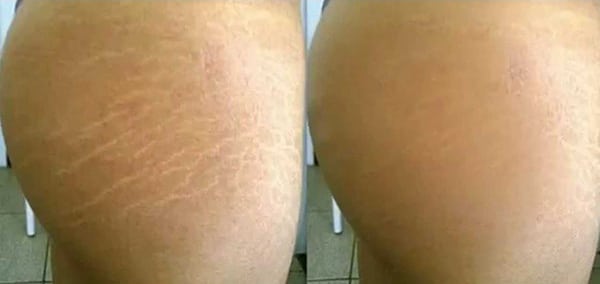
Before white stretch marks After Excimer laser
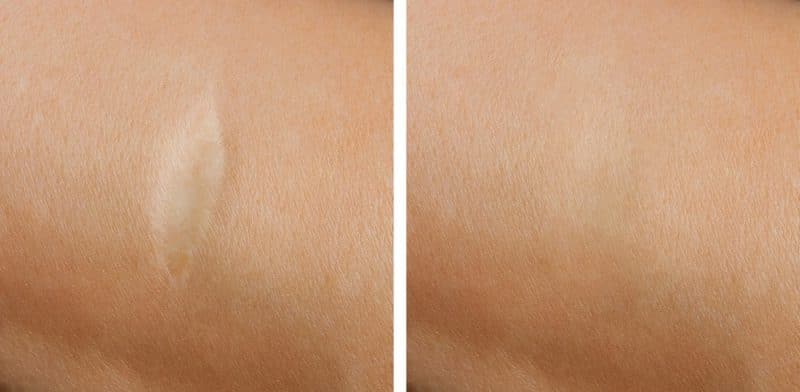
White scar After Excimer laser regimented
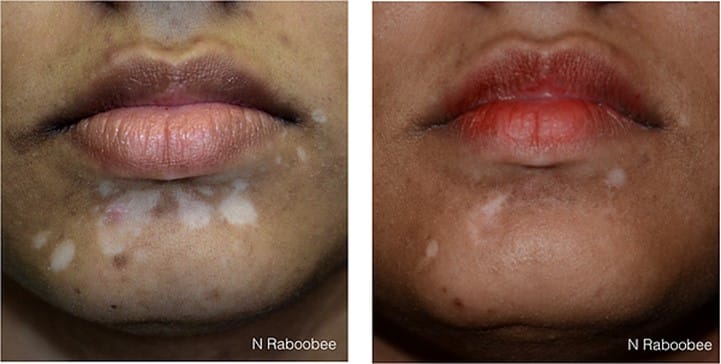
Vitiligo After Excimer laser
For further information or to book a consultation to treat hypopigmentation please contact the clinic at 03300 417494


